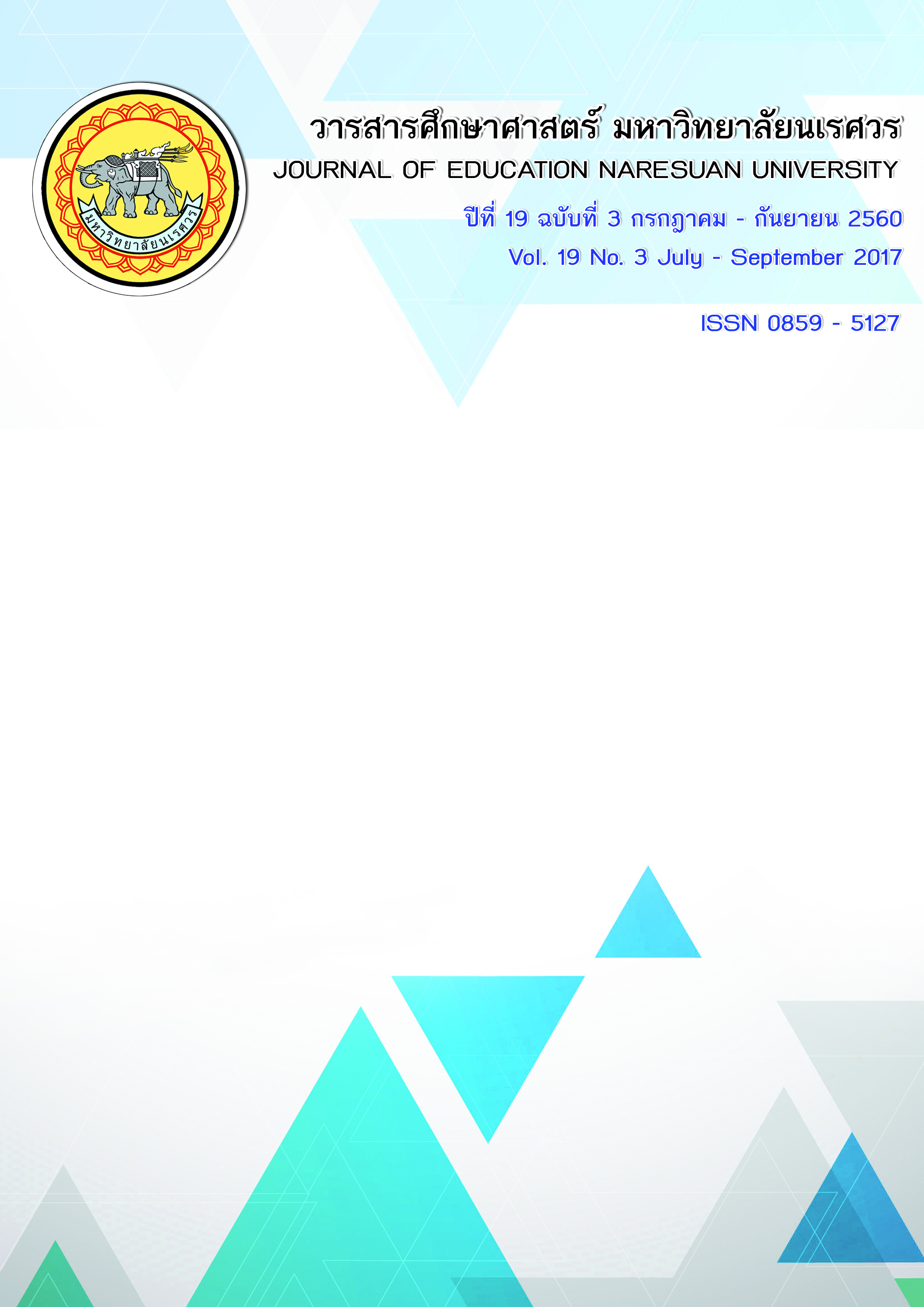การพัฒนาเกมคอมพิวเตอร์จำลองสถานการณ์ เพื่อส่งเสริมความสามารถในการคิดเชิงกลยุทธ์ของนิสิตระดับอุดมศึกษา
Main Article Content
Abstract
การวิจัยครั้งนี้มีวัตถุประสงค์ทั่วไป คือ พัฒนาเกมคอมพิวเตอร์จำลองสถานการณ์ เพื่อส่งเสริมความสามารถในการคิดเชิงกลยุทธ์ โดยมีวัตถุประสงค์เฉพาะ 4 ประการ ได้แก่ 1) เพื่อสร้างและหาประสิทธิภาพของเกมคอมพิวเตอร์จำลองสถานการณ์ 2) เพื่อเปรียบเทียบผลสัมฤทธิ์ทางการเรียนก่อนเรียนและหลังเรียนด้วยเกมคอมพิวเตอร์จำลองสถานการณ์ 3) เพื่อเปรียบเทียบความสามารถในการคิดเชิงกลยุทธ์ก่อนเรียนและหลังเรียนด้วยเกมคอมพิวเตอร์จำลองสถานการณ์ และ 4) เพื่อศึกษาความพึงพอใจของนิสิตที่มีต่อการเรียนด้วยเกมคอมพิวเตอร์จำลองสถานการณ์ กลุ่มตัวอย่างที่ใช้ในการวิจัย ได้แก่ นิสิตชั้นปีที่ 2 ภาควิชาเทคโนโลยีและสื่อสารการศึกษา คณะศึกษาศาสตร์ มหาวิทยาลัยนเรศวร ภาคเรียนที่ 1 ปีการศึกษา 2558 จำนวน 20 คน ที่ลงทะเบียนเรียนรายวิชาธุรกิจเบื้องต้น เครื่องมือที่ใช้ในการวิจัย ประกอบด้วย 1) แผนการจัดการเรียนรู้ 2) เกมคอมพิวเตอร์จำลองสถานการณ์ 3) แบบทดสอบวัดผลสัมฤทธิ์ทางการเรียน 4) แบบทดสอบความสามารถในการคิดเชิงกลยุทธ์ และ 5) แบบสอบถามความพึงพอใจของนิสิตที่มีต่อการเรียนด้วยเกมคอมพิวเตอร์จำลองสถานการณ์ วิเคราะห์ข้อมูลโดย การหาค่าเฉลี่ย ส่วนเบี่ยงเบนมาตรฐาน และการทดสอบค่าที (t-test) แบบ Dependent ผลการวิจัย พบว่า
1. เกมคอมพิวเตอร์จำลองสถานการณ์เพื่อส่งเสริมความสามารถในการคิดเชิงกลยุทธ์ มีประสิทธิภาพ E1/E2 เท่ากับ 75.20/76.80
2. นิสิตที่เรียนด้วยเกมคอมพิวเตอร์จำลองสถานการณ์มีผลสัมฤทธิ์ทางการเรียนหลังเรียนสูงกว่าก่อนเรียนอย่างมีนัยสำคัญทางสถิติที่ระดับ .05
3. นิสิตที่เรียนด้วยเกมคอมพิวเตอร์จำลองสถานการณ์มีความสามารถในการคิดเชิงกลยุทธ์หลังเรียนสูงกว่าก่อนเรียนอย่างมีนัยสำคัญทางสถิติที่ระดับ .05
4. นิสิตมีความพึงพอใจต่อการเรียนด้วยเกมคอมพิวเตอร์จำลองสถานการณ์ โดยรวมอยู่ในระดับมาก ( = 4.07, S.D. = 0.55)
DEVELOPMENT OF A COMPUTER SIMULATION GAMES FOR ENHANCING STRATEGIC THINKING ABILITY OF HIGHER EDUCATION STUDENTS
The general purpose of this research was to develop computer simulation games for enhancing strategic thinking ability which included four specific objectives: 1) to construct and find the efficiency of the computer simulation games, 2) to compare students’ learning achievement before and after using the computer simulation games, 3) to compare students’ strategic thinking ability before and after learning by computer games simulation, and 4) to study the students' satisfaction to computer simulation games.The samples of this research were 20 undergraduate students in the Department of Educational Technology and Communications, Faculty of Education, who registered in the Introduction to Business Course during the first semester of 2015. The research instruments used in this study were 1) learning management plans, 2) computer simulation games, 3) students' learning achievement test, 4) students' strategic thinking ability evaluation form, and 5) students’ satisfaction questionnaire toward learning by computer simulation games. Statistics used in data analysis were percentage, mean, standard deviation and t-test for dependent sample. The research findings were 1) the efficiency of computer simulation games as E1/E2 efficiency was 75.20 / 76.80 respectively. 2) Students who learned by computer simulation games had higher learning achievement than before learning at the .05 level of significance. 3) Students who learned by computer simulation games had the ability to think strategically higher level than before learning at the .05 level of significance. 4) Students satisfied to computer simulation games overall was in high level ( = 4.07, S.D. = 0.55).
Article Details
The owner of the article does not copy or violate any of its copyright. If any copyright infringement occurs or prosecution, in any case, the Editorial Board is not involved in all the rights to the owner of the article to be performed.
References
Bloom, B. S. (1976). Human characteristics and school learning. New York: McGraw-Hill.
Bokyeong, K., Hyungsung, P., & Youngkyun, B. (2009). Not just fun, but serious strategies: Using meta-cognitive strategies in game-based learning. Computers & Education, 52(4), 800-810. Retrieved May 7, 2017, form https://www.sciencedirect.com/science/article/ pii/S0360131508001954
Boocock, Sarane S., & Schild, E. O. (1968). Simulation Games in Learning. [Abstract]. Education Resource Information Center, 279. Retrieved May 04, 2017, from https://eric.ed.gov/?id=ED026857
CoStu, S., Aydın, S., & Filiz, M. (2009). Students' conceptions about browser-game-based learning in mathematics education: TTNetvitamin case. [Abstract]. Procedia Social and Behavioral Sciences, 1, 1848–1852. Retrieved December 14, 2008, form https://www.sciencedirect.com
Demirbilek, M., & Tamer, S. L. (2010). Math teachers’ perspectives on using educational computer games in math education. [Abstract]. Procedia Social and Behavioral Sciences, 9, 716. Retrieved May 7, 2017, form https://www.sciencedirect.com
Hayes, E. R., & Games, I. A. (2008). Making computer games and design thinking: A review of current software and strategies. Games and Culture, 3(3-4), 309-332. Retrieved May 7, 2017, form https://journals.sagepub.com/doi/abs/10.1177/1555412008317312
Jarernwongsak, K. (2003). Strategic Thinking. Bangkok: Success Media. (in Thai)
Jiraworapong, P. (1984). Principle and Theories of Educational Technology. Phitsanulok: Faculty of Education, Srinakharinwirot University. (in Thai)
Jenjitsiri, O. (2014). Some factors affecting the strategic thinking of Mathayomsuksa 5 students under the Secondary Educational Service Area 1 using the multilevel analysis (Master thesis). Bangkok: Srinakharinwirot University. (in Thai)
Khammani, T. (2002). Pedagogy: knowledge for effective learning processes. Bangkok: Chulalongkorn University. (in Thai)
Khammani, T. (2002). Innovation for learning for teachers in educational reform. Bangkok: Chulalongkorn University. (in Thai)
Knowles, M. S. (1975). Self-Directed Learning: A Guide for Learners and Teachers. Chicago: Follett Publishing Company.
Kusirirat, G., Sittiwong, T., & Jiraworawong, P. (2015). Computer Game Model Simulation to promote strategic thinking of undergraduate students. Journal of Instructional Development Rangsit University, 9(1), 107-120. (in Thai)
Laohajaratsang, T. (2008). Computer - assisted instruction (2nd ed.). Bangkok: Department of Audio-Visual Education, Faculty of Education, Chulalongkorn University. (in Thai)
Ma-aun, R. (2014). Effective teaching and learning management in higher education. Retrieved November 20, 2016, from academic.sct.ac.th/upload/stat/1b6c4e1dc3492a39.doc (in Thai)
Masae, R. (2006). Development and effectiveness of computer-assisted instruction in simulation situations. Academic photography by utilizing a special technique (Master thesis). Bangkok: King Mongkut's Institute of Technology North Bangkok. (in Thai)
Ministry of Education. (1999). The National Education Act. Bangkok: Kurusapa Printing Ladphrao. (in Thai)
Mulkum, S. (2004). 21 Ways to learn: To develop thinking process. Bangkok: Printing Workshops. (in Thai)
Piandee, C. (2013). Development of stimulation game for learning in topic of making chiffon cake for bachelor degree students. Retrieved January 12, 2016, from https://www.research.rmutt.ac.th/?p=12147 (in Thai)
Sanphit, S. (2013). Teaching by game. Retrieved January 27, 2016, from https://innovation.kpru.ac.th/web18/551121802/innovation/index.php/en/2014-02-05-07-34-37 (in Thai)
Sittiwong, T. (2015). Course Description: Introduction to Business (213100). Phitsanulok: Department of Educational Technology and Communications, Faculty of Education Naresuan University. (in Thai)
Songkram, N., & Saelu, A. (2009). Development computer games to improve agriculture knowledge in topic of growing kale (Master thesis). Bangkok: King Mongkut's Institute of Technology Ladkrabang. (in Thai)
Wannasian, D. (2015). MACRO model: Learning Management Model for the 21st Century. Retrieved January 20, 2017, from https://regis.dusit.ac.th/images/news/1421308421_MACRO%20teaching styles for the century%2021.pdf (in Thai)
Wuttirak, A. (2014). Development of learning achievement in commercial registration, partnership and limited companies. Accounting process course of college students, Diploma of Vocational Education (Secondary) 2nd year accounting by learning simulation scenario. SIBA College. Retrieved March 27, 2017, from https://webcache.googleusercontent.com/search? (in Thai)


